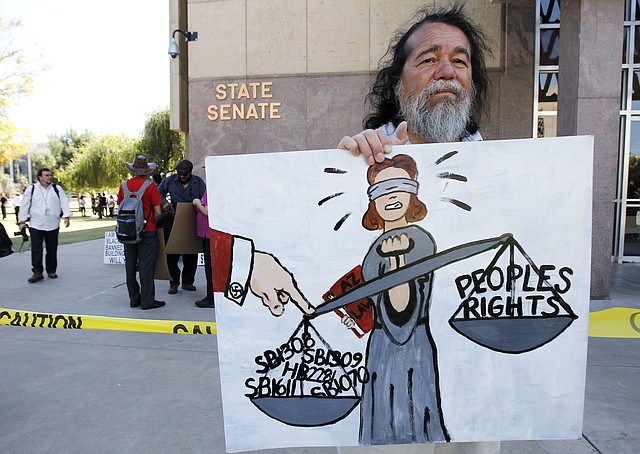Budget turnarounds: Some states socking cash away
Wednesday, June 20, 2012
By PAUL DAVENPORT
Associated Press
PHOENIX - States starting to turn the corner on their Great Recession budget woes are taking the cautious approach, socking away millions of dollars in rainy day funds rather than restoring spending for education, health care and social services.
At least 21 states, including Arizona, Michigan and Ohio, are putting parts of their surpluses into reserves, an approach championed mostly by Republican governors and lawmakers who say the return of revenues to pre-recession levels doesn't mean it's time to spend.
They also cite still-tepid economic growth, potential costs that could flow to the states under the federal health care overhaul's Medicaid expansion and the possibility that federal deficit-reduction efforts will force states to shoulder more costs.
"We've moved from the Great Recession to the Great Uncertainty," said Todd Haggerty of the National Conference of State Legislatures, which recently found that 21 of 29 states projecting surpluses planned to put parts of them into reserves. Other uses include building projects and paying off debt.
A twice-yearly survey of proposed state budgets by the National Governors Association and the National Association of State Budget Officers projected that rainy day balances would increase to $38.8 billion in the fiscal year beginning July 1 in nearly all states, up from $25 billion two years earlier.
It forecast total tax revenue to rise 4.1 percent to $690.3 billion in the 2013 budget year, the third straight year of revenue growth. Total state spending, however, would increase only 2.2 percent and remain below pre-recession levels. That means budgets are expected to remain tight, with hiring unlikely to make a dent in the more than 650,000 state and local government jobs lost since August 2008.
"They want to make sure they have some money in the bank in case things get worse again," said Scott Pattison, executive director of budget officers' group.
Arizona, for example, begins its new fiscal year next month with an $8.6 billion budget that stashes $450 million into a rainy day fund that was completely drained in the recession.
Democrats have complained that some of the money should be spent to restore children's health care, school textbooks, parks projects, adult education and other services that were slashed to help balance budgets during the recession.
"They should be investing the $450 million they are hoarding," Rep. Steve Farley said.
An advocate for children's programs said the fund deposits represent hypocrisy by lawmakers who refused to restore services but approved hundreds of millions of dollars of business and investor tax cuts.
"They're claiming there's no money" to restore child care subsidies and health care for children, said Amy Kobeta, vice president of the Children's Action Alliance. "There's value in planning for our future but it needs to be part of a comprehensive plan."
Michigan Gov. Rick Snyder made a priority of rebuilding the state's emergency fund, which had only $2.2 million left in 2010-11. The state added $362.7 million a year ago and now plans to deposit an additional $140 million under the recently approved budget.
"We'll be prepared. It's smart. This is what we do at home and this is what we do in business. Let's do the same thing in government," the Republican governor said in February as he pitched his plan with a YouTube video.
Michigan Democrats complained the money should be spent on public education and other needs. One lawmaker plunked her rubber boots on the House podium to make the point that it's raining now.
Ohio put nearly $250 million in its fund as Democrats said the state should instead be doing more to help school districts that have had to increase class sizes and local governments that have had to cut services.
"We're at that point. We're actually turning off streetlights now," Rep. Matt Lundy said. "We need to start giving priorities again to our local governments, our local schools."
Minnesota's budget surpluses poured about $881 million into the state's reserve and cash flow accounts since November, bringing both funds to full strength at roughly a combined $1 billion.
Mississippi's new budget socks away $200 million in reserves. Democratic state Rep. Cecil Brown tried unsuccessfully to increase K-12 education spending, saying it didn't make sense to put $200 million in reserves when the state's education formula was short $250 million.
Oklahoma nearly drained its $600 million rainy day fund in 2010 to fill a budget hole but now has $249.2 million in the account and will add an additional $340 million if revenue estimates hold.
"Oklahoma now has a savings account with hundreds of millions of dollars that can provide relief should the state experience an economic emergency," said Aaron Cooper, spokesman for Republican Gov. Mary Fallin.
The emphasis on making big deposits in reserve funds is premature given that many states have yet to restore spending for important programs, said Elizabeth McNichol, a senior fellow at the Center for Policy and Budget Priorities, a liberal research group.
"It certainly makes sense to rebuild your rainy day funds when your economies build up again, but we are a long way from getting out of the hole that the recession put us in," McNichol said.
Joseph Henchman, vice president of state projects for the conservative Tax Foundation, said the counter argument is that states could be at risk if they overcommit to spending.
"Caution is the name of the game, especially when committing to expenses that will continue year after year," he said.
---
Associated Press writers Kathy Barks Hoffman in Lansing, Mich.; Julie Carr Smyth in Columbus, Ohio; Emily Wagster Pettus in Jackson, Miss.; Martiga Lohn in St. Paul, Minn.; and Sean Murphy in Oklahoma City.
